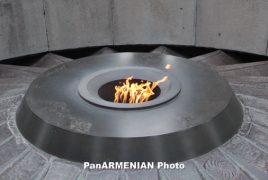Bundestag delegation lays wreath at Armenian Genocide memorial October 5, 2016 - 13:47 AMT PanARMENIAN.Net - A German delegation led by Bundestag Vice-Presidents Johannes Singhammer laid a wreath at the Tsitsernakaberd Armenian Genocide memorial on Wednesday, October 5. A German clergy, also visiting the memorial, prayed for the 1.5 million victims of the massacres near the eternal flame. Afterwards, Singhammer met with the speaker of the Armenian National Assembly, Galust Sahakyan, stressing the need for acknowledging and properly assessing historical facts. The German Bundestag on Thursday, June 2 adopted a resolution on the recognition and the condemnation of the Armenian Genocide. The vote was unanimous in supporting the resolution with just one MP voting against and another one abstaining. Titled “Remembrance and commemoration of the Genocide of Armenians and other Christian minorities in the years 1915 and 1916,” the resolution passed with support from all the parties in Parliament. It was put forward by Chancellor Angela Merkel's conservative bloc, their partners in the government, the Social Democrats, and the opposition Greens.  The Armenian Genocide The Armenian Genocide (1915-23) was the deliberate and systematic destruction of the Armenian population of the Ottoman Empire during and just after World War I. It was characterized by massacres and deportations, involving forced marches under conditions designed to lead to the death of the deportees, with the total number of deaths reaching 1.5 million. As a result of floods in Armenia’s northern Lori and Tavush provinces, 17 bridges, including five large ones, have collapsed. David Vardanyan is the son of former Karabakh leader Ruben Vardanyan who who is currently imprisoned in Azerbaijan. Prime Minister Nikol Pashinyan has met with Stephan Schütz, Executive Partner at Gerkan, Marg and Partners. The number of state universities will be reduced from 23 to 8 by 2030, Minister of Education, Science, Culture and Sport Zhanna Andreasyan has said. Partner news |